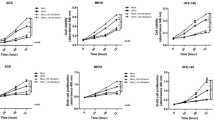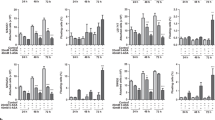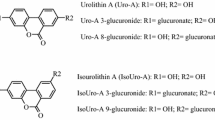Abstract
The direct effects of omeprazole on colonic cells has not been evaluated. Controversy exists regarding the potential adverse effects of omeprazole on cell proliferation. In order to mimic thein vivo situation in the patient treated with omeprazole, proliferation cell culture experiments were performed, monitoring directly the effects of gastrin and omeprazole both alone and in combination. Three colonic cancer cell lines were used, two with neuroendocrine features (NCI-H716, LCC-18) and one (DLD-1) not known to have these features. In thesein vitro proliferation experiments, only the NCI-H716 colorectal cancer cell line responded to omeprazole by decreased proliferation (P<0.05). The effect was concentration dependent shown for all doses of omeprazole used. Gastrin had a statistically significant effect on increasing proliferation in the NCI-H716 cell line alone but only at the highest concentration (10−6M). Omeprazole has a cytostatic effect on one of three colorectal cancer cell lines but the mechanism for this effect of omeprazole and its potential role in treatment awaits elucidation.
Similar content being viewed by others
References
Wormsley KG: Is hypergastrinemia dangerous for man? Scand J Gastroenterol 26(suppl 180):174–178, 1991
Creutzfeldt W, Lamberts R: Is hypergastrinemia dangerous to man? Scand J Gastroenterol 26(suppl 180):179–191, 1991
Lamberts R, Creutzfeldt W, Stodkman F, Jacobaschke U, Maas S, Brunner G: Long-term omeprazole treatment in man: Effects on gastric endocrine cell populations. Digestion 39:126–135, 1988
Lamberts R, Creutzfeldt W, Strüber HG, Brunner G, Solcia E: Long-term omeprazole in peptic ulcer disease: Gastrin, endocrine cell growth and gastritis. Gastroenterology 104:1356–1370, 1993
Lechago J, Correa P: Prolonged achlorhydria and gastric neoplasia: Is there a casual relationship? Gastroenterology 104:1554–1557, 1993
Burlinson B, Morriss SH, Gatehouse DG, Tweats DJ: Genotoxicity of gastric acid inhibiting drugs. Lancet 335:419–420, 1990
Goodlad RA, Lee CY, Alison MR, Sarraf CE, Ghatei MA, Bloom SR, Wright NA: Evaluation of a proposed technique to assess unscheduled DNA synthesis and genotoxicity. Gut 34:235–241, 1993
Ryberg B, Tielemans Y, Axelson J, Carlsson E, Hakanson R, Mattson H, Sundler F, Willems G: Gastrin stimulates the self-replication role of enterochromaffin-like cells in the rat stomach. Effects of omeprazole, ranitidine, and gastrin 17 in intact and antrectomized rats. Gastroenterology 39:935–942, 1990
Furihata C, Hirose K, Matsushima T: Genotoxicity and cell proliferative activity of omeprazole in rat stomach mucosa. Mutat Res 262:73–76, 1991
Phillips DH, Hewer A, Osborne MR: Interaction of omeprazole with DNA in rat tissues. Mutagenesis 7:277–283, 1992
Sachs G, Scott D, Reuben M: Omeprazole and the gastric mucosa. Digestion 47(suppl 1):35–38, 1990
Crofton-Sleigh C, Doherty A, Ellard S, Parry EM, Venitt S: Micronucleus assays using cytochalasin-blocked MCL-5 cells, a proprietary human cell line expressing five human cytochromes P450 and microsomal epoxide hydrolase. Mutagenesis 8:362–372, 1993
Mereto E, Ghia M, Martelli A, Brambilla G: Lack of evidence of omeprazole genotoxicity in Sprague-Dawley rats. Mutagenesis 8:379–386, 1993
Park JG, Oie HK, Sugarbaker PM, Henslee JG, Chen TR, Johnson B, Gazdar A: Characteristics of cell lines established from human colorectal carcinoma. Cancer Res 47:6710–6718, 1987
Lundqvist M, Mark J, Wedell, B, Morstyn CT, Öberg K: Characterization of a cell line (LCC-18) from a cultured human neuroendocrine differentiated colonic carcinoma. Eur J Cancer 27:1663–1668, 1991
Lind T, Cederberg C, Ekenved G, Haglund U, Olbe, L: Effect of omeprazole—a gastric proton pump inhibitor on pentagastrin stimulated acid secretion in man. Gut 24:270–276, 1983
Vinayek R, Amantea M, Maton PN, Frucht H, Gardner JD, Jensen RT: Pharmacokinetics of oral and intravenous omeprazole in patients with the Zollinger-Ellison syndrome. Gastroenterology 101:138–147, 1991
Ingram D, Bloch R: Mathematical models in medicine. Part 1. New York: John Wiley & Sons, 1984
Hurwitz A: Clinical pharmacology of agents for the treatment of acid-related disorders.In Peptic Ulcer Disease and Other Acid-Related Disorders. D Zakim, AJ Danner (eds). New York, Academic Research Associates, 1991, pp 339–379
Kaunitz JD, Sachs G: Identification of avanadate-sensitive potassium-dependent proton pump from rabbit colon. J Biol Chem 26:14005–14010, 1986
Penman ID, El-Omar JR, Hillan KJ, O'Dwyer PJ, McColl KEL: Omeprazole inhibits colorectal carcinogenesis induced by azoxymethane in rats. Gut 34:1559–1565, 1993
Diaz D, Fabre F, Daujat M, Saunt Aubert B, Bories P, Michel M, Maurel P: Omeprazole is an aryl hydrocarbon-like inducer of human hepatic cytochrome P450. Gastroenterology 99:737, 1990
Parkinson A, Hurwitz A: Omeprazole and the induction of human cytochrome P-450: A response to concerns about potential adverse effects. Gastroenterology 100:1157–1164, 1991
Kolars JC, Turgeon DK, Watkins PB: Omeprazole and aryl hydrocarbon hydroxylase: Should we be worried? Hepatology 13:197–199, 1991
Tobi M, Darmon E, Rozen P, Avigdor S, Rattan J, Santo M, Barnea ER: Large bowel mucosal biotransformation activity in persons at high risk for colorectal cancer. Scand J Gastroenterol 28:958–962, 1993
Andersson T, Bergstrand R, Cederberg C, Lagerstrom PO, Skanberg I: Omeprazole does not affect the metabolism of caffeine. Gastroenterology 101:943–947, 1991
de Waziers I, Cugnenc PH, Berger A, Leroux JP, Beaune DH: Drug-metabolizing enzyme expression in human normal, peritumoral, and tumoral colorectal tissue samples. Carcinogenesis 12:905–909, 1991
Murphy J, Phillips R, Luk G, Tang D, Maydonovitch C, Wong PKH: Omeprazole induced hypergastrinemia does not increase colonic mucosal proliferation. Gastroenterology 104:A432, 1993
Sobhani I, Lehy T, Laurent-Puig P, Cadiot G, Ruszniewski P, Mignon M: Chronic endogenous hypergastrinemia in humans: Evidence for a mitogenic effect on the colonic mucosa. Gastroenterology 105:22–30, 1993
Tobi M, Mehta R, Nunez J, Goo R, Gesell M, Cheng TI, Luk GD: Zollinger-Ellison syndrome, hypergastrinemia and colorectal neoplasia. Gastroenterology 98:A315, 1990
Orbuch M, Zubensky IA, Weber HC, Strader DB, Gibril F, Jensen RT: Prolonged marked hypergastrinemia does not increase the rate of colonic neoplasia. Gastroenterology 104:A152, 1994
Author information
Authors and Affiliations
Rights and permissions
About this article
Cite this article
Tobi, M., Chintalapani, S., Goo, R. et al. Omeprazole inhibits growth of cancer cell line of colonic origin. Digest Dis Sci 40, 1526–1530 (1995). https://doi.org/10.1007/BF02285203
Received:
Revised:
Accepted:
Issue Date:
DOI: https://doi.org/10.1007/BF02285203




